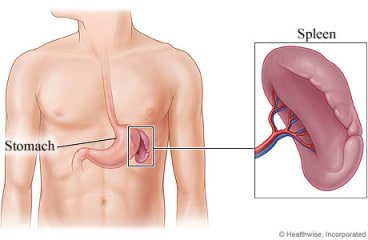Overview

Mononucleosis, also called mono, is an infection usually caused by the Epstein-Barr virus. Mono is spread through contact with saliva, mucus from the nose and throat, and sometimes blood or semen.
You can get mono from kisses that share saliva with someone who has mono. Or you may get it by sharing a drinking glass or utensils with that person. The person may not be sick at the time, or they may have had mono sometime in the past.
Symptoms include a fever and a very sore throat. You may also have swollen glands and tonsils and feel weak and tired.
Mono may cause your spleen to swell. The spleen is an organ in the upper left side of your belly. If it ruptures, it's an emergency. So it's important for you to avoid contact sports or strenuous activities while you have mono. These increase the risk of damage to the spleen.
Most people get better in 2 to 4 weeks. It may take several more weeks before your normal energy is back. The lymph nodes in your neck may be larger than normal for a while. Lots of rest and keeping your work or activity schedule light will help you feel better.
Follow-up care is a key part of your treatment and safety. Be sure to make and go to all appointments, and contact your doctor if you are having problems. It's also a good idea to know your test results and keep a list of the medicines you take.
How can you care for yourself at home?
- Rest when you feel tired. Getting enough sleep will help you recover.
- Drink plenty of fluids. If you have kidney, heart, or liver disease and have to limit fluids, talk with your doctor before you increase the amount of fluids you drink.
- For a sore throat, suck on lozenges or gargle with salt water. To make salt water, mix 1 teaspoon of salt in 8 ounces of warm water.
- Be safe with medicines.
- Take your medicines exactly as prescribed. Call your doctor if you think you are having a problem with your medicine.
- Take an over-the-counter pain medicine, such as acetaminophen (Tylenol), ibuprofen (Advil, Motrin), or naproxen (Aleve), for a sore throat or headache or to lower a fever. Read and follow all instructions on the label.
- Do not take two or more pain medicines at the same time unless the doctor told you to. Many pain medicines have acetaminophen, which is Tylenol. Too much acetaminophen (Tylenol) can be harmful.
- Do not play contact sports or do strenuous activities for 4 weeks. Do not lift anything heavy. Too much activity increases the risk of damage to your spleen.
- Try not to spread the virus to others. Avoid kissing that shares saliva, and don't share dishes, glasses, eating utensils, or toothbrushes for at least a few weeks. The virus is spread when saliva from an infected person gets in another person's mouth. It's hard to know how long you may be contagious.
- If you know you have mono, do not donate blood. There is a chance of spreading the virus through blood products.
When should you call for help?
Call 911 anytime you think you may need emergency care. For example, call if:
- You passed out (lost consciousness).
Contact your doctor now or seek immediate medical care if:
- You have trouble breathing or shortness of breath when lying down.
- You have trouble swallowing.
- You have new or worse belly pain.
- You are dizzy or lightheaded, or you feel like you may faint.
- You have symptoms of dehydration, such as:
- Dry eyes and a dry mouth.
- Passing only a little urine.
- Feeling thirstier than usual.
Watch closely for changes in your health, and be sure to contact your doctor if:
- You do not get better as expected.
Where can you learn more?
Go to http://www.healthwise.net/patientEd
Enter Z786 in the search box to learn more about "Mononucleosis: Care Instructions".
Current as of: September 30, 2025
Author: Ignite Healthwise, LLC Staff
Clinical Review Board
All Ignite Healthwise, LLC education is reviewed by a team that includes physicians, nurses, advanced practitioners, registered dieticians, and other healthcare professionals.

